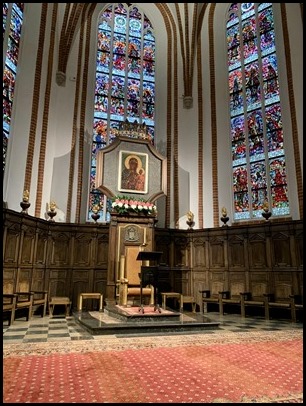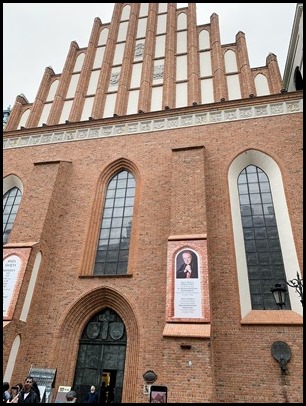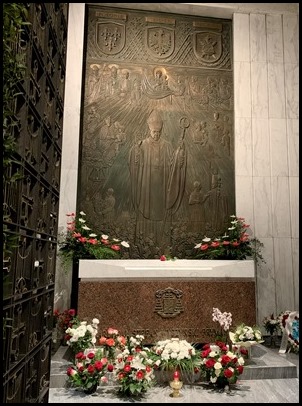Hello and welcome!
I’d like to begin this week by sharing with you a letter I issued earlier today regarding the situation in Haiti and with Haitian refugees on our southern border:
On September 6, I was able to visit Haiti to meet with Cardinal Langlois of Les Cayes, to survey the challenges now confronting the Haitian people and to express the solidarity of the Archdiocese, home to one of the largest Haitian communities in the United States, with the Church and the nation of Haiti. I was delighted to spend time with a fine young priest in Haiti, Fr. Louis Merosné, who was raised in St. Angela Parish in Mattapan and then returned to Haiti to pursue a vocation to the priesthood. 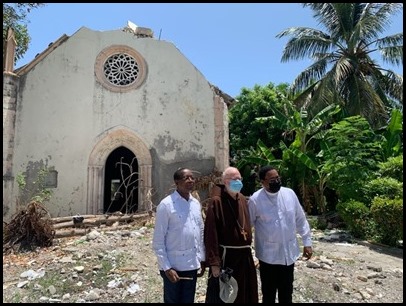
Even a brief visit two weeks ago vividly illustrated the threefold crisis now in Haiti. First, the political crisis catalyzed by the assassination of the President with far-reaching consequences for governance. Second, the social-legal crisis, created by the control that gangs exercise in parts of the country. Third, all this is complemented by the devastating poverty and dislocation caused by the second massive earthquake along with a hurricane suffered by Haiti and the COVID health crisis, all occurring in the span of ten years.
Remarkably, the Haitian people and the Church in Haiti manifest great faith and resilience in the midst of such suffering and chaotic conditions. I am grateful for their witness.
The United States has exercised pervasive influence in Haiti for over a century, often a history marked by mistaken policies and ill-conceived ideas. Once again, the United States is inextricably involved with Haiti and its crisis. Once again, U.S. policy seems to be a mix of very helpful and also some very concerning measures. The present Administration has committed significant funding for humanitarian assistance and disaster relief after the hurricane. These steps respond positively and directly to the request made by Cardinal Langlois to the international community. In addition, our government has extended the Temporary Protective Status (TPS) for Haitians in the United States, a crucially important measure.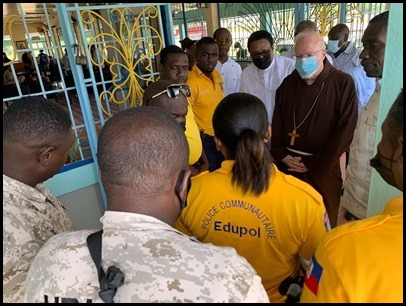
At the same time, however, the United States is now carrying out an airlift of Haitian men, women, and children back to Haiti. The decision affecting some 14,000 Haitians now at the Texas border is a surprisingly and shockingly inhumane policy. The Administration has the legal authority for its policy, but the policy is blind to the moral and human consequences of this action. Haiti, the poorest country in the Western hemisphere, is incapable of absorbing this influx of young and older Haitians, all traumatized by the journey to the U.S. border. To be sure, many made this journey under mistaken assumptions about U.S. policy. But this fact does not absolve our country’s policy choices. Some cases of human suffering are sufficiently overwhelming to change the logic of existing policy. In this case, there is the need for a review and recasting of U.S. policy. The airlift should be halted while this review is conducted. Only then will it be possible to shape a short-term policy worthy of the U.S. role in the world and appropriate for the crisis Haitians now face.
In the encyclical “Fratelli Tutti”, Pope Francis appealed to humanity to set aside conflicts, resentment and quests for power, in favor of solidarity, collaboration and mutual support. The Holy Father shared his hope that, “by acknowledging the dignity of each human person, we can contribute to the rebirth of a universal aspiration to fraternity between all men and women.” These sentiments are evident in his call for the international community to provide relief for the tragic situation the Haitians are facing. In addition to the collection for Haiti taken up in our parishes, the Church in Boston will continue to call for a more compassionate policy from the U.S. government for Haitians at the border. I ask all to pray for the nation of Haiti and the Haitian community there and in our country, and to be generous in supporting efforts to raise funds to help those suffering in this humanitarian crisis.
I spent much of this week in Poland, where we were holding a conference on safeguarding organized by the Polish Bishops’ Conference and the Pontifical Commission for the Protection of Minors.
But before I left Rome, on Saturday, I had an opportunity to celebrate a Mass for the Missionaries of Charity who run the Dono Di Maria (“Gift of Mary”) shelter for women and children within the Vatican. 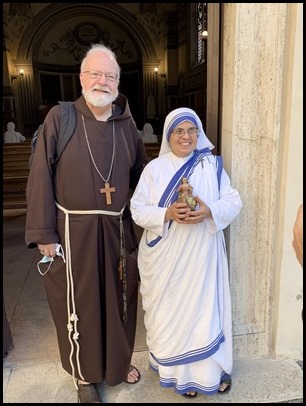
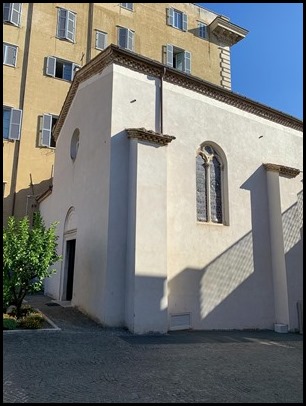
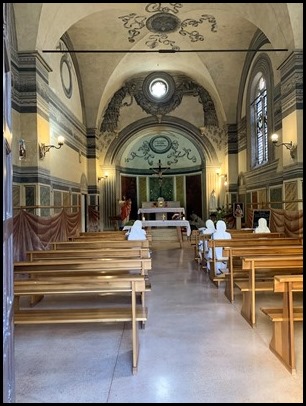
 I took note of their Knights of Columbus window
I took note of their Knights of Columbus window
As many of you know, I have a long association with the Missionaries of Charity, and it’s always a joy to be together with the sisters and see their marvelous work.
Later that day, I also had a chance to introduce Father Michael Nolan to the Holy Father.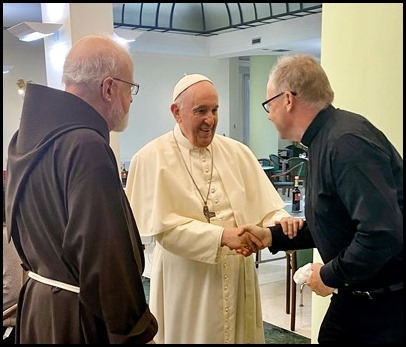
On Sunday, I arrived in Poland for the conference. This was only my second time being in Poland, which is a very beautiful country. 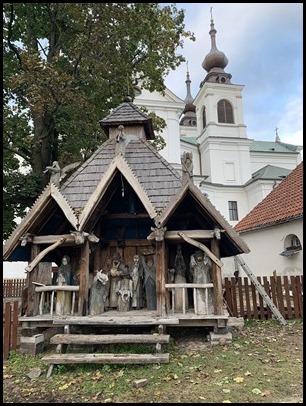
This church was very near to the site of the conference. I thought it looked very typical of Eastern European churches, with the onion domes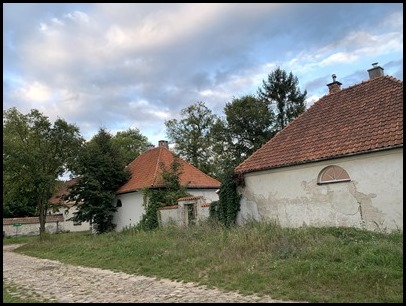
I enjoyed being in Warsaw and was particularly impressed with the Old City, which was completely destroyed by the Nazis but rebuilt exactly as was in medieval times. It really is very beautiful.
I was very happy to be able to visit the cathedral where Cardinal Stefan Wyszynski is buried. He had been beatified just the week before, along with Mother Elzbieta Roza Czacka.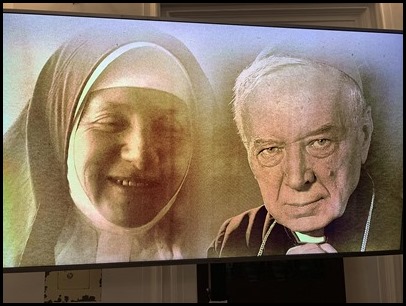
While we were in Warsaw, we happened upon a pro-life rally that was taking place in the center of the Old City.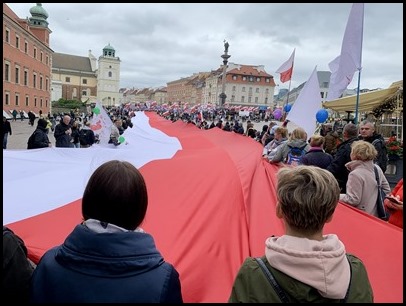
It was very encouraging to see that Catholics in other parts of the world are raising their voice on behalf of the unborn.
Our conference began on Sunday and lasted until Wednesday. It was held at a center that was once a seminary.
We began Sunday night with a Vespers service at which we heard the testimony of survivors of clergy sexual abuse.
Originally, we had been concerned that the pandemic might affect the attendance because, of course, at the present time, it is not easy to bring large groups of people together. However, we had a very good number of people that included not only bishops but also vicars general, religious superiors, vicars for clergy, canon lawyers, and those who are working with survivors of sexual abuse. So, there was quite a cross-section of attendees representing 20 different countries of Eastern and Central Europe. 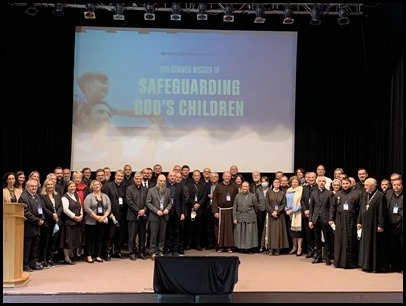
Over the course of the four-day meeting, there were a number of addresses given that, I think, were all very helpful. There was also a great deal of time for discussion among the participants. After every talk, we broke up into language groups, giving people an opportunity to discuss the topic, share their experiences, pray together and listen to the testimony of the survivors of sexual abuse.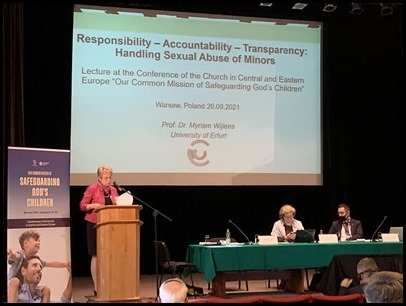
I’d like to share the text of my address with you here:
I am Cardinal Sean O’Malley, Archbishop of Boston and President and a Member of the Pontifical Commission for the Protection of Minors. I am honored to be with you today as we begin this Conference which has been organized jointly by the Bishops’ Conference of Poland and the Commission, with the support of representatives from many other bishops’ conferences throughout Central and Eastern Europe. A special word of thanks goes to Archbishop Stanisław Gądecki, President of the Polish Bishops’ Conference, for providing us a warm welcome and for all the work his colleagues have done to facilitate our meeting.
I know that many have been hoping for this seminar for several years; we are all pleased that we can now be here with you. I am grateful to our hosts here in Warsaw, who have always intended that this be a Conference for the entire region. The organizing committee deserves special recognition for having persevered in their efforts to move the planning ahead. In good part, our coming together here is a result of their dedication and commitment.
We have just heard an encouraging and challenging message from the Holy Father, who assures us of his closeness to all persons whose lives have been impacted by the scourge of sexual abuse and encourages us to offer recommendations for strengthening safeguarding of minors and vulnerable adults and as best possible preventing sexual abuse in the life of the Church and society at large.
Before a more in-depth reflection on the Holy Father’s message, I would like to offer a few words on the timeliness of our gathering.
I. Context of our Current Meeting
Our purpose in gathering together over the next few days is to reflect upon a variety of experiences that are particular to the Church in Central and Eastern Europe and also in many ways similar to the experience of sexual abuse in other parts of the world. In addition to representatives of the Church in this region and persons skilled in accompanying survivors in the ongoing journey toward healing, I am pleased that several members of the Pontifical Commission for the Protection of Minors will be with us during the coming days. These members bring extensive experience in support for survivors, prevention training and education, and in-depth knowledge of the canonical and administrative issues that need to be addressed in order for the Church to take timely and meaningful action with regard to sexual abuse of minors and vulnerable adults. I am confident that they can also assist the professionals from the region in the work of establishing a reliable system of child protection and support for survivors.
We are all aware of the havoc wreaked on our lives by the COVID-19 pandemic and the uncertainties brought on by policies concerning travel and quarantine. Our Conference has been impacted by these circumstances, and several of our colleagues in safeguarding and prevention ministry are not able to be with us in person. We have made efforts to be as inclusive as possible and extend our warmest regards to them, knowing that they are very much in our hearts and minds during these days.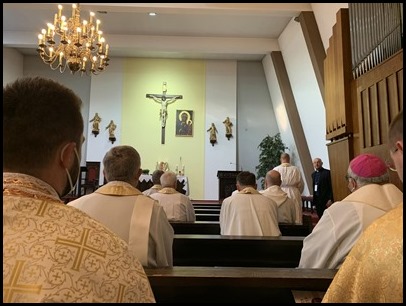
I also want to express a debt of gratitude to the women and men who each day accompany survivors throughout, bringing them professional skills, compassion and care. They are a dedicated group of lay people, priests and sisters, walking with our brothers and sisters who have been harmed by the crimes and sins of clergy, religious and other workers in the Church.
Last month, I was privileged to meet with several of these persons by teleconference, some of whom I have known for many years through their involvement with this ministry and others I was pleased to meet for the first time. Together we discussed ways that we could strengthen the Church’s outreach to survivors. Their service is of critical importance and must be supported. On behalf of our Holy Father and in my own name, I wish to make clear our gratitude for the critically important service provided by these witnesses of God’s love and our commitment to support their ministry.
II. The Reality of Abuse: From Boston to Warsaw
Here in Poland and in the Archdiocese of Boston, as in many places throughout the world, we have experienced the shattering impact of sexual abuse. We are blessed that many gathered for this Conference give significant time and effort to correct the injustices of the past and bring healing to our Church and society. We all must be advocates for the safeguarding of minors and vulnerable adults and work tirelessly to promote transparency, accountability and zero tolerance.
Although the crisis of sexual abuse in the Church has been known to us for some time, many people are just beginning to come to terms with the reality of this situation. As the crisis unfolded from one country to the next, it became clear that sexual abuse had tragically infiltrated the Church in all countries and all cultures. There is no place or group of people that is immune to being impacted by the evil of abuse.
You have seen and heard the painful stories of survivors of sexual abuse and perhaps experienced them many times. The testimonies that have become the basis of the public reckoning over the past few years were often shared by a person who was abused by clergy or religious many years ago, perhaps shared with a family member or a friend or someone in the life of the Church. We know that the time when a person is ready and able to share that they were abused is very personal and may not be until many years after the abuse took place. We can never presume to know another person’s history or circumstances. 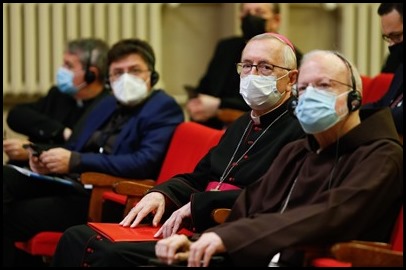
Many survivors speak of their abuse as a source of tremendous pain and shame. Many often feel some sense of personal guilt for what has been done to them by clergy or religious, as if they were in some way responsible for the abuse. And when some summoned the courage to speak out, to name the truth of the abuse, they were often ignored and told to not speak of that reality. That injunction, which greatly magnified the pain and suffering of a survivor, often came from within the Church or from family members. Far too often, there was more concern for protecting the reputation of clergy and the Church than for the survivor. That response is as morally reprehensible as the crime of the abuse itself.
The Holy Father has called us to an inclusive and transparent path in addressing the consequences of sexual abuse in the Church. His words have been strong and clear: there is absolutely no place in ministry for those who abuse minors.
III. Pastoral Conversion in Evangelii Gaudium
From the very beginning of his ministry, Pope Francis has emphasized the importance of pastoral conversion as a missionary path for the entire Church. Such conversion brings with it the type of transformation necessary to ensure that the Gospel reaches every person and every part of our lives. The Holy Father reminds us of the teaching of Pope Paul VI, who called for a deep renewal at the personal level and on the part of the entire Church. Conversion at both the personal and institutional level is at the heart of the process of renewal and is essential to Pope Francis’ call for a “missionary transformation” of the Church.
Pastoral conversion is important for us as we focus our efforts on renewing the Church in the face of sexual abuse. We must work for change that will be incorporated in all aspects of the life of the Church, combatting sexual abuse wherever it has occurred regardless of the status or office of the person who committed the crime. It is my hope that the following steps may be a guide for the ministry of safeguarding and caring for minors and vulnerable persons in our Church.
A. Listening
Pope Francis has called us to begin the journey of conversion by acknowledging the truth of what has happened. To do this, we must adopt the approach of a listening heart. Those who have heard the testimony of survivors know how difficult and challenging these experiences are. I have personally met with hundreds of survivors; their testimonies are heart-wrenching, especially when they share that no one believed them when they first reported the abuse. We can only imagine, but in truth never fully understand, how much more difficult it has been for those who have been abused and forced to live with the consequences their whole lives.
When someone who has been abused by clergy, religious or other persons in the Church tells their story we must receive them and their testimony with the utmost reverence. There need to be clear channels of communication and encounter by which survivors can contact the Church if they wish to. It is encouraging that many dioceses have a contact person or a dedicated phone service or email account for survivors or their family members to use. This is a good and important initiative. If a diocese does not receive much response after establishing these means of contact, it does not mean that the reality of sexual abuse by clergy or religious is not present in your communities. A lack of response may well be an indication that the established channels of communication are not adequate or appropriate for the particular circumstances of your diocese or your country. It is important that we all maintain a focus on providing accessible, welcoming and non-judgmental opportunities for survivors and their loved ones to be in contact and engage in dialogue with the local Church.
We must also be aware of the reality that there are many persons in our communities who have suffered the tragedy of sexual abuse in the Church and have never spoken to anyone about their experience.
Our colleague Dr. Ewa Kutz has written about the complexity of the testimony of victims in an insightful article recently published in L’Osservatore Romano. She wrote:
“Those who have been wounded are speaking. Some demand their right to speak and be heard at the top of their lungs. Others speak about it timidly within the quiet of a psycho-therapeutic setting, or they confide only in their loved ones. Some scream. Others speak by remaining silent with their silence.”
It is quite possible that some people listening now are survivors of sexual abuse or have been impacted by the abuse of their loved ones and have not yet shared that information with others, whether the abuse occurred in the Church, at school, among peers or in family life. 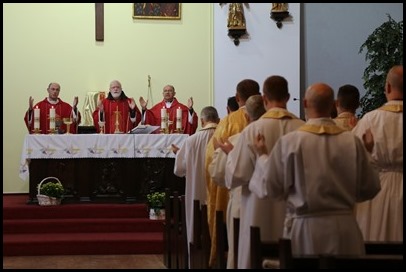
We know that all survivors want to heal and also know that each person has their own time when they are ready and able to begin that journey. It is our sincere prayer that all survivors and their loved ones can receive support and assistance for healing, and we understand how important it is for people to make their own choices about their journey and to do so in their own time.
Allowing survivors to bring their experiences to the Church will hopefully help to provide them consolation and healing and will also inform our ongoing work of instituting reforms, policies, and procedures.
B. Acknowledging Survivors
For us to achieve the pastoral conversion the Holy Father calls us to, we must provide honest and clear recognition of those who have been abused. Listening to the pain of others, to the sufferings of God’s people, leads to acknowledgement of the wrong that has been done and the suffering that has been inflicted. Pastoral conversion requires a turning away from an inappropriate defensiveness that can be very harmful and hurtful and embracing a deeper listening to the survivor, with a willingness to understand more fully what they have experienced.
An obstacle to this recognition, especially for pastors, is what the Holy Father referred to as a “misguided concern for the reputation of the institutional Church.” Especially in those places where the Church has been subjected to systematic persecution for a long time, a defensive response to accusations of abuse can often seem an instinctive response. While pastors do hold responsibility for the protection of the Church, and in many cases have suffered or given their lives in defense of the faith, a skeptical and sometimes even demeaning response to testimony of abuse can cause serious damage to the people the Church is called to hold as a priority for pastoral care and concern, namely, those broken and wounded by abusive ministers within the Church itself.
The Holy Father recognizes that accepting the wrongs that have been committed by the Church’s ministers can, indeed, make us feel vulnerable. But vulnerability can also be lived as a moment of grace, a moment of kenosis, an experience of God’s action in our world that brings healing by shining light on a place of darkness so that all people can live more freely as disciples and believers. It means that we can continue to be dedicated co-workers in the Lord’s vineyard while at the same time remaining honest about the abuse that has occurred among Christ’s faithful.
C. Seeking Forgiveness
Acknowledging the truth of what has happened leads us further along the path of conversion and renewal. We cannot preach what we ourselves have not accepted as true in our hearts. For pastors and others in leadership in the Church, listening to and affirming the reality of sexual abuse by the Church’s ministers engages us in a process of conversion. We cannot fail to be moved by what we hear and come to know, following Jesus who was moved when he saw the needs of the people.
In the context of their duty to deal with the sexual abuse of minors and vulnerable persons, clergy are advised to adopt a learning approach so that they can become better teachers in their diocese or religious order. The Church needs to learn from the survivors who hold a particular position of being able to teach us.
If we situate this dynamic within the context of an encounter with Christ, we can see in the survivor someone who has been unjustly treated, who has been made to suffer and who, in many cases, has been rejected in their suffering by the Church itself. By adopting the role of protagonists in our communities, survivors can provide an important insight to Gospel truth that opens the way for a new evangelization, even of the Church itself. Seeking reconciliation with survivors should emerge from this listening and acknowledging the reality of sexual abuse. As Pope Francis urged us in his opening message today:
“Only by facing the truth of these evil practices and of humbly seeking pardon from victims and survivors will the Church find its way to a place where it can be relied upon once again as a place of welcome and safety for those in need.”
Providing survivors with a sincere apology is important. However, “seeking pardon” requires more than issuing a statement or holding a meeting. Rather it is a process that is rarely achieved in one moment and sometimes may not be achieved at all. Every survivor’s experience and journey is deeply personal and different from that of any other person. As the Lord seeks out the lost and abandoned, so priests, religious and lay ministers must seek the pardon of those who have been harmed. For clergy and religious, the process of pastoral conversion is aided by our seeking pardon from all those impacted by sexual abuse.
Clearly, this is not an easy path to walk, but walk it we must, together with victims and all those impacted. We are called to enter through the narrow gate, ensuring that no one is left behind.
D. Concrete Pathways of Reform
Listening to and acknowledging survivors and sincerely seeking their pardon are indispensable steps in this journey of renewal. They are part of the restoration that needs to take place if the Church is to recover credibility and promote healing. The community requires that a just order be maintained, and the just order of the Church has been fractured by the crimes of some of its ministers.
Again, the Holy Father outlines the importance of this next step, as he tells us:
“Our expressions of sorrow must be converted into concrete pathways of reform to both prevent further abuse and to give confidence to others that our efforts will bring about real and reliable change.”
In this regard, the vital work of creating policies, procedures and guidelines must be undertaken, and they should be reviewed and updated on a regular basis. Requirements for screening, training and mandatory reporting to civil authorities are crucial. Without clear and definite policies and procedures, people try to improvise, often with good intention, but the results are all too often disastrous. Yet, we know that policies themselves are not enough. We need effective methods to audit compliance and monitor the implementation of policies.
Training and background checks for Church personnel are essential, as well as undertaking safeguarding audits and ensuring our canonical and civil procedures are both up-to-date and in harmony with each other.
Other presenters during our Conference will speak more on these matters. However, these steps constitute a “concrete pathway of reform,” as the Holy Father has indicated and without which we will not achieve authentic pastoral conversion.
Conclusion
The journey of learning with regard to the crime and sin of sexual abuse in the life of the Church will be ongoing throughout our lives. We have a long way to go. With the assistance of dedicated and competent people like those gathered here and many others in the regions, who are committed to the process of healing and reconciliation, I am confident that we are on the right path and can make meaningful progress, always putting concern for and the needs of the survivors first as we move forward.
I want to acknowledge and thank all survivors who continue to come forward to share their stories. It is because of their courage that protection for minors and vulnerable adults and assistance services are becoming central components in the life of our Church. Because of them, outreach is offered to others who have been gravely harmed by the Church, and others are spared from experiencing this horror.
As far back as 1988, in addressing the bishops of Austria, Pope Saint John Paul II stressed the importance of transparency, urging the Church to be like a “glass house” where all can be seen from the outside, even what might appear as ugly and shameful. This message is of great importance today. We must not be afraid of what we might see when looking at these situations of abuse and of how they were handled by the Church in past times. Looking honestly at these situations provides a moment of truth, especially for survivors, regarding what happened, what didn’t, and particularly what went wrong. Honest assessment of our failures gives the Church the insights needed for the ongoing work of doing all that is possible to prevent further abuse in the future.
Once again, I would like to thank the Polish Bishops Conference for hosting us all here, and to all of you engaged in this very important ministry in the Church. You are in my prayers as we walk this path of reform and renewal together.
I think that the outcome of the conference was very positive, and the participants were grateful for the opportunity to speak about this problem and talk about prevention, particularly going forward. They were also very anxious to learn about the types of safeguarding efforts being taken in other parts of the world.
I’m proud of the hard work that the commission did to prepare for this conference. We are particularly grateful to commission member Hanna Suchocka, who was formerly Polish Minister of Justice, Prime Minister and Ambassador to the Holy See. She was instrumental in helping us to organize this gathering.
On Monday, during the course of the conference, we had a virtual meeting of the council of cardinals advising the Holy Father. Our principal topic was the upcoming Synod of Bishops, which will focus on synodality. We hope that our next meeting, scheduled for December, will be in person.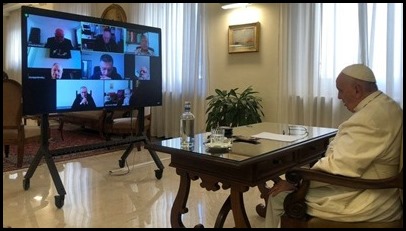
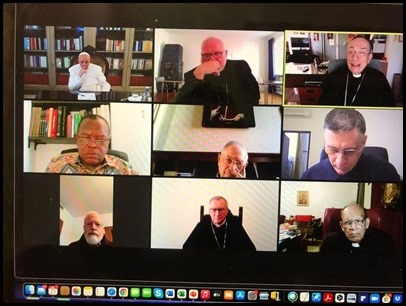
On Tuesday, I was invited to dinner by the Apostolic Nuncio to Poland, Archbishop Salvatore Pennacchio.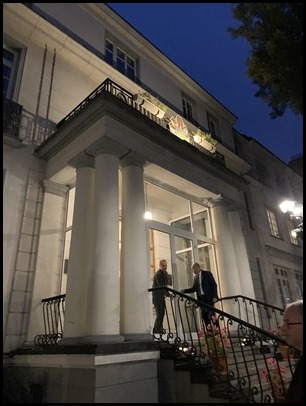
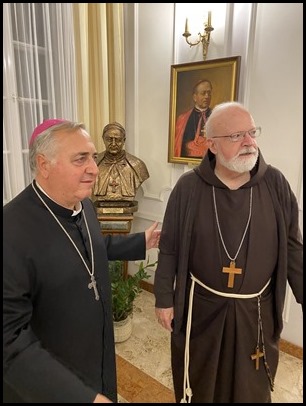
They have a beautiful chapel in the nunciature decorated with mosaics of Polish Saints. 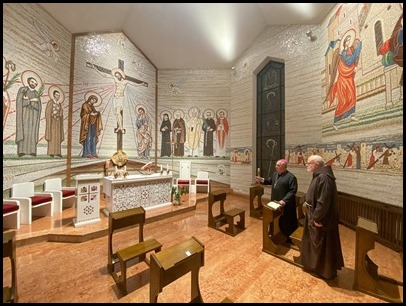
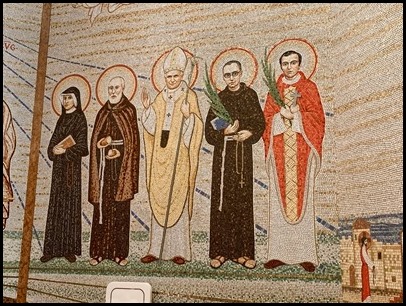
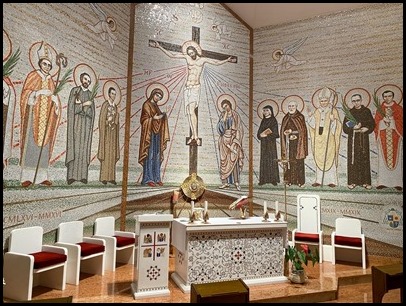
They also have some Swiss Guard uniforms on display.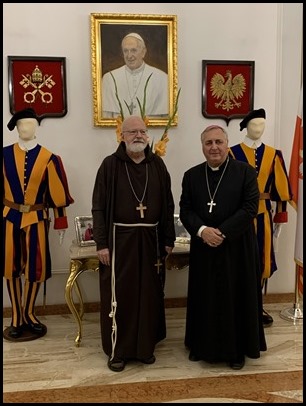
He told me that three former nuncios to Poland had gone on to become pope. So, I told him that he’d better be careful, or he might be next! 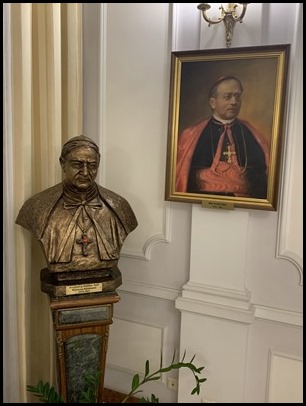
Outside the nunciature, they have this statue of Pope Pius XI, one of the former nuncios to Poland who became pope.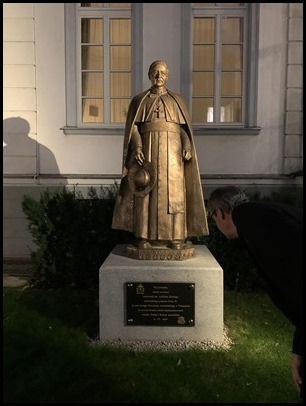
Following the conference, I returned to Boston, and on Thursday, I met with the Superior General of the Scalabrinians, Father Leonir Chiarello, who is currently visiting the dioceses in the United States where the Scalabrinians have ministries. He came accompanied by General Counselor Father Mario Geremia and Father Lino Garcia Ayala, who is the administrator at St. Anthony’s in Somerville.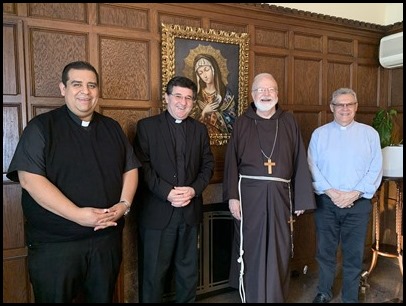
The Scalabrinian Fathers have a beautiful spirituality of ministry to migrants and immigrants. They originally worked with Italian immigrants and now staff Italian-American parishes and do a great deal of work with the Hispanic and Brazilian communities. They have been a presence in the archdiocese for many decades, and they currently staff three parishes here: St. Anthony’s in Cambridge, St. Anthony’s in Somerville and St. Tarcisius in Framingham.
I was grateful to have the chance to meet with them thank them for the work of their community here. I told him that I had lunch last week in Rome last week with my good friend Cardinal Silvano Tomasi, who is a Scalabrinian. Cardinal Tomasi was the pastor at the Italian parish in Washington 50 years ago at the time that I was working at the Centro Catolico.
As a gift, Father Leonir gave me a rosary with medallions of different Saints of the Scalabrinian order.
Thursday afternoon, we had a Zoom meeting on The Bethlehem Project with some of our staff and the leaders of different ministries and institutions that are serving the homeless in the Boston area.
In addition to our own agencies, such as Catholic Charities and the Planning Office for Urban Affairs, other organizations such as St. Francis House, Father Bill’s Place, Pine Street Inn and Boston Healthcare for the Homeless were with us.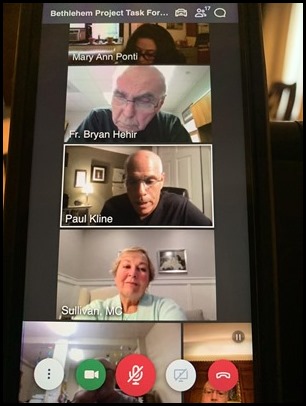
It was a very fruitful meeting as we are looking for ways to involve more people in this ministry and to bring to bear more ideas of how to address homelessness in the larger community. We are so grateful to Deacon Paul Klein, MC Sullivan and Father Bryan Hehir for all their work in bringing this gathering together.
Unfortunately, because I was away, I was unable to present for the visit of Sierra Leone President Julius Bio, his wife, Fatima, and Sierra Leone’s Ambassador to the U.S. Sidique Abou-Bakarr Wai. 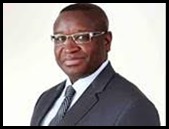
President Bio
The president and first lady were in Boston to give an address at Harvard and came to join us for the 11:30 Mass at the Cathedral last Sunday. Among other projects, they support initiatives for the advancement of the protection of children in Africa, which is very helpful to the work of the Pontifical Commission for the Protection of Minors. I’m sorry to have missed their visit.
Until next week,
Cardinal Seán

